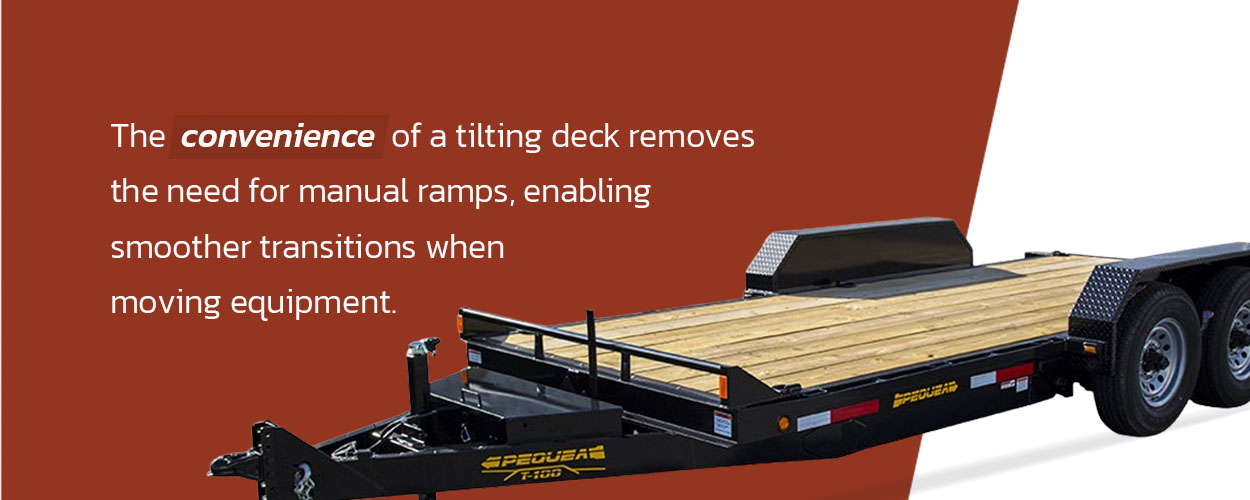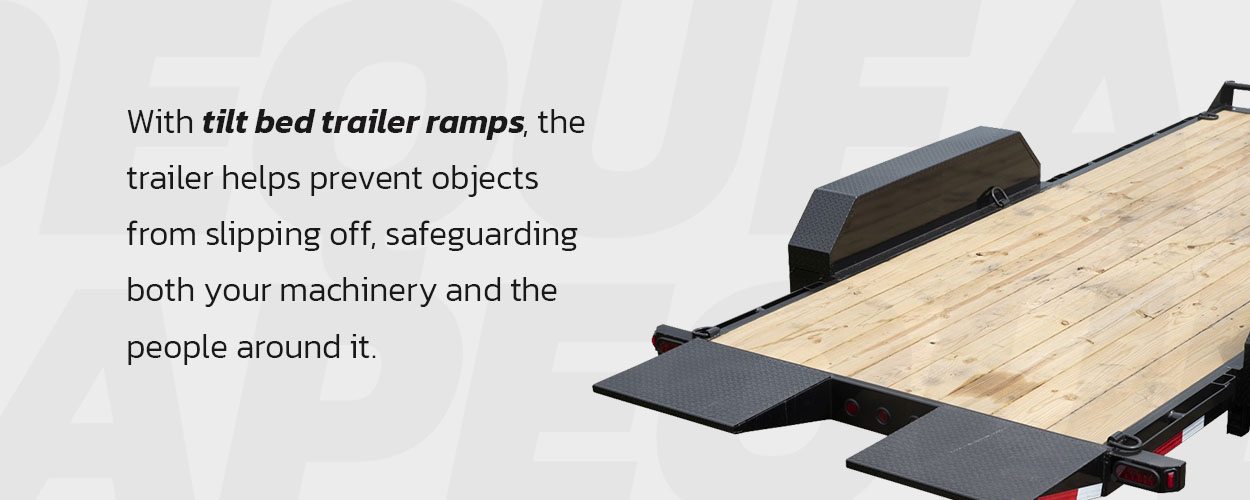Tilt Bed Trailer vs. Ramps
Everyone with a trailer has had to deal with loading something too heavy or awkward to lift on their own. As a result, you need a ramp or a tilt bed trailer. Adding an incline lets you quickly load equipment and objects onto your trailer, reducing injury and difficulty. However, you might need help lining everything up with the ramp correctly, or it might be too steep. A tile bed trailer solves this issue with ease.
With a powered tilt deck, loading and unloading equipment or materials is a breeze. It also reduces the risk of steep inclines. Choosing a tilt bed can significantly improve your loading process while easing its physical demands. Let's go over some pros and cons of a tilt bed trailer, why they perform better than ramps and utility trailers and when they work best for you.
What Is a Tilt Bed Trailer?
A tilt bed trailer, also called a tilt deck trailer, tilting utility trailer, tilt ramp or tilt bed, is a trailer with a tilting deck. The tilting deck makes loading and offloading heavy machinery and equipment more manageable than a standard, non-tilting trailer.
A full-tilt deck means the deck tilts completely during equipment loading and unloading. This is perfect for trucks with scissor lifts or forklift attachments. The width and complete movement of the deck make equipment or vehicle hauling highly efficient.
There are also industrial tilt decks. For these trailers, the back deck tilts while the front deck always stays in place. A non-tilting front allows you to haul equipment with various attachments. Both industrial and full-tilt decks come with hydraulic mechanisms, which allow the deck to tilt independently without putting strain on you as you load.
Understanding Trailer Types: Ramp, Tilt and Utility Trailers
Learn more about each trailer type, deck design and maintenance requirements — and why tilt bed trailers are often the best choice for your hauling needs.
Tilt Bed Trailers
The tilting feature is the key difference between a tilt bed and a ramp. Tilt decks, as the name suggests, tilt. The deck moves to act as a ramp for loading. As the equipment is moved on and off the deck, it'll tilt — this allows you to carry around a trailer and ramp in one convenient piece instead of having a separate ramp for your trailer. Both ramps and tilt beds have their own benefits and uses — the right one for you will depend on what you prefer and what you're hauling.
Tilt bed trailer ramps are typically used for transporting heavy machinery, vehicles and other large loads. The convenience of a tilting deck removes the need for manual ramps, enabling smoother transitions when moving equipment.
Tilt trailers provide easy operation but may require more frequent cleaning than regular trailers. Take note of these maintenance tips:
- Hydraulic system care: To ensure efficient operation, tilt trailers with hydraulic cylinders must have oil and filters changed regularly.
- Lubricate moving parts: Apply oil to pivot joints, bolts and other moving components to minimize wear, friction and corrosion.
- Check for wear and damage: Regularly inspect the trailer's deck, pivot joints and hydraulic parts for signs of deterioration. If so, have them repaired or replaced.
- Clean and store properly: Clean tilt trailers routinely to avoid the buildup of dirt and debris. Store them in a sheltered and dry place away from outdoor elements.
Trailer Ramps
A trailer ramp hooks into the back of your trailer, creating a smooth incline that makes loading and offloading objects onto the trailer easier. Some ramps are attached to your trailers, while others are mobile, so you can latch them to different trailers as needed. Trailer ramps are versatile and easily adaptable for a wide range of vehicles.
Whether transporting equipment or a car for personal use, trailer ramps allow you to load vehicles safely and efficiently. Their incline helps reduce strain on you and your hauling vehicle, ensuring smoother loading and unloading than manually lifting equipment and materials.
Here are key maintenance tips to keep them in good condition:
- Lubricate hinges: Keep pivot joints and moving components well-oiled to reduce wear and prevent rust and premature damage.
- Clean regularly: Dirt, mud and debris can affect traction and cause safety issues. Clean them frequently to prevent buildup on the ramps.
- Inspect the ramp: Regularly check the ramp for signs of damage, such as cracks, bends and loose joints that can compromise its stability.
- Proper storage: When not in use, store ramps in a covered and dry space. Avoid exposure to elements to prevent premature wear and damage.
Utility Trailers
Utility trailers are versatile and lightweight transport options that haul a wide range of materials. They're smaller than traditional trailers and can easily be attached to a truck or car. These options are commonly used to move furniture and appliances. Businesses also use them to transport lawn and compact equipment. They can carry bulky materials and irregularly shaped objects. Their sturdy build ensures that equipment and materials stay secure, whether you're hauling for short or long distances.
Utility trailers come in a variety of designs, including steel or aluminum frames. The trailer deck can be made of wood, metal or plastic. They can have a single-axle or dual-axle, with a range of gate and ramp options for convenient loading.
Standard maintenance for utility trailers includes the following:
- Grease hinges: Regular lubrication prevents rust from corroding the hinges and bolts and keeps the moving parts functional.
- Clean regularly: Sweep the deck to remove dirt and debris. Clean the taillights with a mild detergent and water solution and wipe with a dry cloth.
- Remove stuck debris: To remove a significant buildup of road debris from the frame, use a high-pressure washer.
Benefits of a Tilt Deck Trailer
Tilt deck trailers have dozens of uses — their unique design makes them well-suited for equipment that's heavy or difficult to load. If you're considering upgrading your trailer to make your life easier, here are some of the benefits of a tilt bed trailer:
Versatile Loading
The wide size of a tilt bed means you can load a wide range of objects onto your trailer. As long as you're within the weight limit and can get your equipment on the trailer, you can haul it. The tilt deck simplifies awkward loading and allows you to haul different loads easily.
Some objects a tilt bed can carry include:
- Snowmobiles
- ATVs
- Riding lawnmowers
- Tool chests
- Plant machinery
- Sort and hobby vehicles
Protects Heavy Objects
By titling, the deck helps keep equipment secure, lowering the risk of damage or accidents. It makes safely rolling heavy equipment or material onto the trailer simpler, minimizing physical strain and promoting a safer work environment.
Additionally, the vast size of the tilt trailer gives you more room to maneuver and secure objects. Having more space while loading and hauling lowers your chances of things falling over and off the trailer.
Maximizes Space
With tilt bed trailer ramps, the trailer helps prevent objects from slipping off, safeguarding both your machinery and the people around it. The ease of loading with a tilt deck minimizes physical strain, making the process of loading and unloading safer.
Makes Loading Easier
Instead of unloading and loading a ramp every time you need it, the trailer will do all the ramp tilting for you, reducing strain and energy use. Letting the hydraulics do the tilting and not having to deal with separate ramp unloading will save you time and effort that you can put into better things.
What Can You Use a Tilt Bed For?
While there are dozens of uses for tilt equipment trailers, they work best for heavier items and machinery. Ramps are more manageable for some tasks, but a tilt bed provides a stable, wide space for loading and unloading. If you're thinking about getting a tilt bed, you can use it for transporting:
- Heavy items: Loading heavy equipment onto your trailer using a ramp can be time-consuming and exhausting. Lifting cargo onto a trailer can lead to falls, damage and injuries. Using a tilt bed reduces strain and improves loading safety and efficiency.
- Cars: Tilt decks make loading cars even easier. You have to line everything up just right to use a ramp, and getting the right vehicle clearance for loading can be challenging. With a tilt bed, you don't have to worry about any of this. You'll avoid scraping the bottom of the car and make vehicle transport a breeze.
- Power sport vehicles: Motorcycles, ATVs and other vehicles will be much simpler and faster to load with a tilt bed. Speed and security are essential for transporting power sport vehicles — you want to get to your destination as soon as possible, and you don't have to worry about anything except enjoying yourself on your vehicle. You can quickly load and unload the tilt deck to maximize your sport time.
Choose a Reliable Tilt Trailer From Pequea
The right tools will help improve the quality, efficiency and safety of your hauling. With a tilt bed trailer, you can ensure the secure transport of your load for long or short hauls. At Pequea, we know how essential your equipment is. With over 40 years in equipment manufacturing, we've perfected our products to ensure you get high-quality, durable equipment for your needs.
Enjoy quick, convenient vehicle and transport equipment with one of our high-performance full or industrial tilt trailers. Additionally, we carry a wide range of other trailer types and agricultural equipment to help you find a product you can trust. Contact us to find a dealer or get additional support today!

